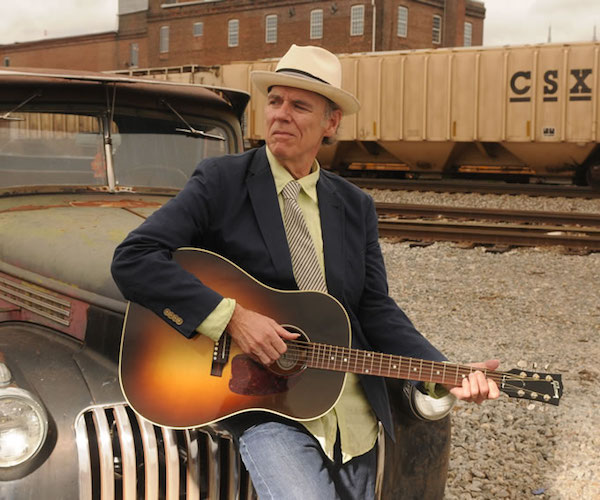Music Review: Singer/Songwriter John Hiatt — Making a Cranky Sort of Peace
John Hiatt’s voice has taken on some Tom Waits-like cragginess in recent years — and since the lyrics call for that, he tends to accent the rough spots instead of hiding them.

John Hiatt — Photo: Michael Wilson.
By Brett Milano
John Hiatt is the kind of artist you’d love to sit in the living room and swap a few stories with, but an intimate show at Lexington’s Cary Hall will do in a pinch. I hadn’t seen Hiatt live since a good decade ago, at which time he was rocking a large venue with an electric band. And in truth, the energy he puts forth in an acoustic show isn’t all that different.
I’m sure I’m not the only fan who’s lost touch with Hiatt’s last round of albums — like most fans I was mostly there for the major-label glory days. And I’m not talking about the two albums everybody loves, 1987’s Bring the Family and the following year’s Slow Turning — both albums that he made in the wake of getting sober, marrying, and generally turning his life around. Those were fine, but for me it was the more eccentric batch that came afterward —Perfectly Good Guitar, Walk On and even the critically slammed Little Head. All those albums showed him as an edgier rocker with a quirkier sense of humor (and a great sense of riffage). The sober-minded fans started rebelling when he came out with lines like “I’m talking with a tight red sweater/ I’m feeling like Eddie Vedder — More power to him for that.
Hiatt did some of everything at Cary Hall, devoting the first half of the show to some of those deep tracks: “Terms of My Surrender” and “Master of Disaster,” the title songs from their respective albums, both made a cranky sort of peace with advancing age, even if the latter is something of a love song. Hiatt’s voice has taken on some Tom Waits-like cragginess in recent years — and since the lyrics call for that, he tends to accent the rough spots instead of hiding them. He also plays guitar like he forgot it’s an acoustic show, strumming hell out of the thing to make up for lack of a band.
At one point — and surprisingly, at only one point — it nearly turned into an all-request show as fans found a convenient quiet time for shouting song titles. Hiatt chose two to play, one of which he would surely have done anyway: “Tennessee Plates,” the rocker about a no-account guy on a weekend joyride through Elvis country. But the other request was one of those quirkier numbers: “Ethelyne,” with the timeless observation that “Some men avoid love/ Like it was a plague or something/ So they can leave the seat down when they piss”. (My own request for “Solar Sex Panel” sadly went nowhere).
The night closed with his two biggest hits, both from Bring the Family: “Thing Called Love” is best-known via Bonnie Raitt’s cover version (as Hiatt noted onstage, “I put two girls through college on that one” — but his version remains a scrappier, Stonesier rocker. The inevitable encore was “Have a Little Faith in Me,” which also benefit the most from the solo-acoustic setting. It’s a song that one gets tempted to dress up — Hiatt himself did a drastically overproduced remake with gospel choir — but it remains a more effective testimony with just one guitar and one emotive vocal.
Brett Milano has been covering music in Boston for decades, and is the author of Vinyl Junkies: Adventures in Record Collecting (St. Martins, 2001) and The Sound of Our Town: A History of Boston Rock & Roll (Commonwealth Editions, 2007). He recently returned from New Orleans where he was editor of the music and culture magazine OffBeat. His latest book is Don’t All Thank Me At Once (125 Records), a biography of the unsung pop genius Scott Miller, who led the bands Game Theory and The Loud Family.
Tagged: Brett Milano, Bring the Family, Cary Hall, John Hiatt, Lexington MA
